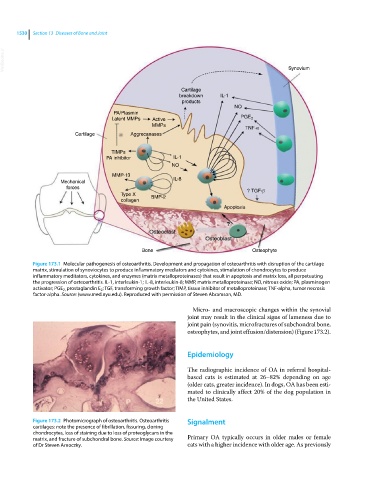Page 1592 - Clinical Small Animal Internal Medicine
P. 1592
1530 Section 13 Diseases of Bone and Joint
VetBooks.ir Synovium
Cartilage
breakdown IL-1
products
NO
PA/Plasmin
Latent MMPs Active PGE 2
MMPs TNF-
Cartilage – Aggrecanases
TIMPs
PA inhibitor IL-1
NO
MMP-13
Mechanical IL-8
forces ? TGF-
Type X BMP-2
collagen
Apoptosis
Bone Osteophyte
Figure 173.1 Molecular pathogenesis of osteoarthritis. Development and propagation of osteoarthritis with disruption of the cartilage
matrix, stimulation of synoviocytes to produce inflammatory mediators and cytokines, stimulation of chondrocytes to produce
inflammatory meditators, cytokines, and enzymes (matrix metalloproteinases) that result in apoptosis and matrix loss, all perpetuating
the progression of osteoarthritis. IL‐1, interleukin‐1; IL‐8, interleukin‐8; MMP, matrix metalloproteinase; NO, nitrous oxide; PA, plasminogen
activator; PGE 2, prostaglandin E 2 ; TGF, transforming growth factor; TIMP, tissue inhibitor of metalloproteinase; TNF‐alpha, tumor necrosis
factor‐alpha. Source: (www.med.nyu.edu). Reproduced with permission of Steven Abramson, MD.
Micro‐ and macroscopic changes within the synovial
joint may result in the clinical signs of lameness due to
joint pain (synovitis, microfractures of subchondral bone,
osteophytes, and joint effusion/distension) (Figure 173.2).
Epidemiology
The radiographic incidence of OA in referral hospital‐
based cats is estimated at 26–82% depending on age
(older cats, greater incidence). In dogs, OA has been esti-
mated to clinically affect 20% of the dog population in
the United States.
Figure 173.2 Photomicrograph of osteoarthritis. Osteoarthritis Signalment
cartilages: note the presence of fibrillation, fissuring, cloning
chondrocytes, loss of staining due to loss of proteoglycans in the
matrix, and fracture of subchondral bone. Source: Image courtesy Primary OA typically occurs in older males or female
of Dr Steven Arnoczky. cats with a higher incidence with older age. As previously

